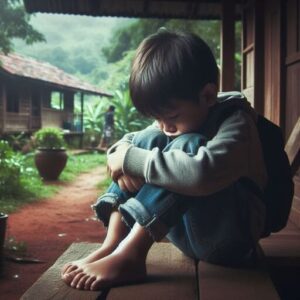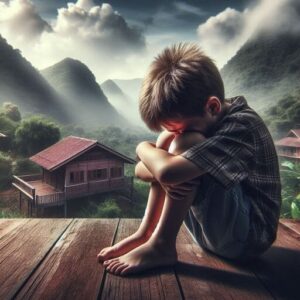Childhood Mental Illnesses List: 16 Psychiatric Disorders in Children
Mental health of children is the way children feel and think about themselves and the people or world around them. Their mental health affects how they cope with stresses and challenges of life.
Anxiety problems, depression, behavior problems, and ADHD are most commonly diagnosed child psychiatric disorders. In 2016-19, according to the Center of Disease Control and Prevention, in the US about 9.4% of children were diagnosed with anxiety, 9.8% with ADHD, 8.9 with behavioral disorders, and 4.4% with depression.

In this article, we will discuss mental health in children in detail. The information on this page provides a list of childhood mental illnesses list, so that you may know about child psychiatric disorders by reading this article. This article also provides a list of 16 psychiatric disorders in children.
Childhood mental illnesses list
Child psychiatric disorders can begin in childhood, such as, anxiety disorders, autism spectrum disorder, attention-deficit/hyperactivity disorder (ADHD), depression and other eating disorders, mood disorders, and post-traumatic stress disorder (PTSD). If these issues are left untreated, they can prevent children from reaching their full potential. Many adults who get mental health treatment have had mental disorders since their childhood and wish they got treatment in their early life.
Childhood mental illnesses is following:
Anxiety disorders
Constant worries, anxiety or fear are anxiety disorders in children. It disrupts the ability of children to participate in school, play, or typical social situations. Diagnosis of this disorder may include generalized anxiety, social anxiety, and obsessive-compulsive disorders.
Attention-deficit/hyperactivity disorder (ADHD)
Children who have this disorder have difficulty with impulsive behaviors, attention, hyperactivity as compared to children of the same age group.
Autism spectrum disorder (ASD)
This is a neurological and developmental disorder. Although autism spectrum disorder can be diagnosed at any age, as it is a developmental disorder its symptoms usually appear before age 3. It affects how people communicate, interact with others, learn, and behave.
Eating disorders
These are the behavioral conditions that are characterized by constant and severe disturbance in eating behavior. The most common eating disorders are bulimia nervosa, binge eating disorder,anorexia nervosa avoidant restrictive food intake disorder (ARFID). These disorders result in life-threatening complications and emotional dysfunction.
Depression and other mood disorders
It is the constant feelings of loss of interest and sadness. Depression affects the ability of a child to perform in school and child’s interaction with others. Bipolar disorder causes unusual changes in the energy, mood, concentration and activity levels among children. These disorders are risky or unsafe for children.
Disruptive behavior disorders
Children with disruptive behavior disorders have defy rules and attention-seeking behavior in structured environments, like school.
Pervasive developmental disorders
Children with pervasive developmental disorders are commonly confused in their thinking and are unable to understand the world around them.
Elimination disorders
Elimination disorders affect behavior that are related to using the bathroom. Bed-wetting or enuresis, is the most common elimination disorder.
Learning and communication disorders
Children with learning and communication disorders have problems with storing and processing information, along with their thoughts and ideas.
Tic disorders
Tic disorders cause a person to do sudden, repeated, meaningless, and involuntary (not perform on
purpose)movements and sounds, known as tics.
Oppositional Defiant Disorder (ODD)
It is a type of behavior disorder. It is commonly diagnosed in childhood. Oppositional defiant disorder generally starts before 8 years of age, but no later than by about 12 years. Children having ODD are hostile, defiant, and uncooperative towards parents, peers, teachers and other people they know well. They often blame other people for their own misbehavior and mistakes.
Conduct Disorder
Conduct Disorder (CD) in children is diagnosed when a child shows a progressing pattern of aggression toward the others, and social norms and serious violations of rules in school, at home, and with peers. These violations of rule may involve breaking the laws and then result in arrest. Conduct disorder in children leads children to get injured and have difficulties coping with peers. Children with CDs tend to lie, steal, or damage property of other people on purpose.
Obsessive-compulsive disorder (OCD)
OCD is a type of anxiety disorder. Obsessive-compulsive disorder (OCD) is diagnosed when children have persistent, intrusive thoughts and compulsions that may interfere with their ability to perform. OCD may arise at any age, preschool through adulthood, but it is most likely to develop in pre-adolescent years.
Psychosis
Psychosis is a severe brain illness. If a child is experiencing psychosis he may lose contact with reality and may face difficulty with differentiating what is real and what is not. They may also suffer from false beliefs, delusions about what is happening around them or who they are, and hallucinations, which is hearing or seeing things that are not there in reality. Psychosis may occur with a number of mental health disorders such as schizophrenia or bi-polar disorder.
Post-traumatic stress disorder (PTSD)
PTSD is prolonged anxiety, emotional distress, distressing memories, disruptive behaviors, nightmares and disruptive behaviors in response to injury, abuse, violence, abuse, or other traumatic events.
Schizophrenia
It is a disorder in thoughts and perceptions in which people interrupt touch with reality.it may result in a combination of extremely disordered thinking, hallucinations, delusions, and behavior that affects daily functioning.
All the above disorders are childhood mental illnesses list.

Signs of mental illness in children
Depression, anxiety, eating disorder, schizophrenia, PTSD, etc are common emotional disorders among children. Childhood emotional disorders may have following symptoms:
Emotional and behavior signs
Your child:
- Does not enjoy things the way they used to
- behaves in a aggressive way
- seems unhappy or sad and cries a lot
- remains afraid or worried a lot
- gets very upset by separating from you and avoids social situations
- starts behaving the way they are outgrown, such as sucking their thumb and wetting the bed
- has trouble while paying attention and can not sit still or restless.
Physical signs
Your child:
- can not sleep well or oversleeps
- feels difficulty while getting out of bed
- Overeats or has trouble eating
- has lost or gained weight
- face physical pain that does not have a medical cause. For example,nausea, headaches, stomach aches,or other physical pains.
School and social signs
If child is a student, he may have following signs of mental illness:
- his performance is not same as usual at schools
- having problems while fitting at school or adjusting with other children
- does not like to go to school
- is not obeying his teachers
- does not like his friend circle
- doesn’t like to go to social events like sports activities or birthday parties.
Signs of mental illness in 3 year-old and 7-year old are almost the same as mentioned above.
How is mental illness in children treated?
-
Psychotherapy
It is also known as behavior therapy or talk therapy. Psychotherapy is an approach for addressing mental health issues by talking with a mental health professional such as a psychologist. Psychotherapy includes playing games or play time, and talking about your mental health problems while playing games with young children. During this treatment, children and adolescents are taught how to talk about their feelings and thoughts, how to react to them, and how to learn new coping skills and behaviors.
-
Medication
Your mental health professional or health care provider of a child recommends medication. These medicines include stimulant, anti-anxiety medication, antidepressant, antipsychotic or mood stabilizer as part of the child treatment plan. The provider of your child will explain side effects, risks, and benefits of drug treatments.
-
Family counseling
Some mental health professionals include family members in the treatment of children. This can help family members to understand how challenges of a child affects relationships with family, friends or siblings.
-
Support for parents
Individual or group sessions are arranged for parents. These sessions include opportunity and training to talk with other parents. It can provide parents with new strategies to support a child and manage his behavior in a positive manner.
How can we help our child cope with mental illness?
You will play a lead role in supporting the treatment plan of your child. Parent should:
- Learn about mental health illness.
- Should arrange family counseling that treats whole members of the familyin a treatment
- Talk to the mentalhealth professional of your child for advice on how to behave with your child and handle critical situations.
- Should know stress management techniques which helpthem to respond calmly to children.
- Seek ways to enjoy or have fun with your child.
- Praise the abilitiesand strength of your
- Regularly visit the schoolof the child to ensure necessary support.
Ways to support a child
Listen to your child
Ask your child regularly what’s going on in his life, talk about their emotions or feelings, and assure them that you are always with them to listen to your child.
Support them in difficulties
It is very difficult to face challenging behavior, but you should try to understand your child and support him.You should pay attention to the way your child is behaving or feeling and always try to support them in difficult times.
Stay involved in their life
You should show interest in the life of your child and the things that are important to them. In this way, the child will value himself and you will find the child’s problem easily and support them.
Encourage their interests
Encourage and support your child to discover their interests. learning new things, being a part of a team and being creative or active, helps to connect us and improve our mental health.
Take seriously what they say
Listening and valuing your child makes them feel important. You should find ways to help your children to control their emotions in a good manner.
Build positive routines
Try to construct regular routines. You should develop healthy eating and exercise routines among children. Your child should have a fixed time for going to bed and getting up.
Summary
Mental health in children is challenging sometimes. Even under the desirable circumstances, the emotions and behaviors of children can change rapidly and frequently. All children are irritable, anxious, sad, or aggressive sometimes. In some situations they find it difficult to pay attention, stay still, or interact with someone else. In some children, this behavior indicates that the child is suffering from mental health issues. There are many symptoms of childhood emotional disorders. Signs of mental illness in children include physical, emotional, behavioral, school and social symptoms and signs.
